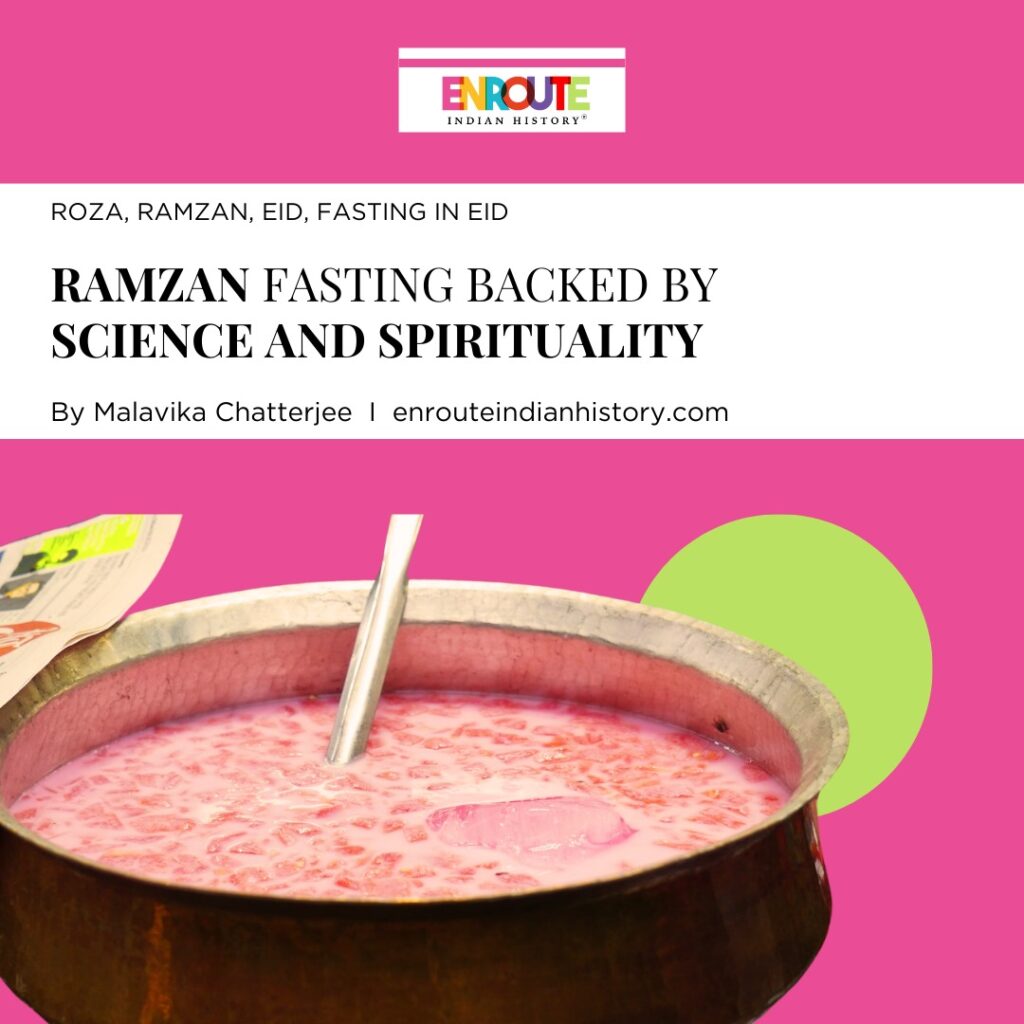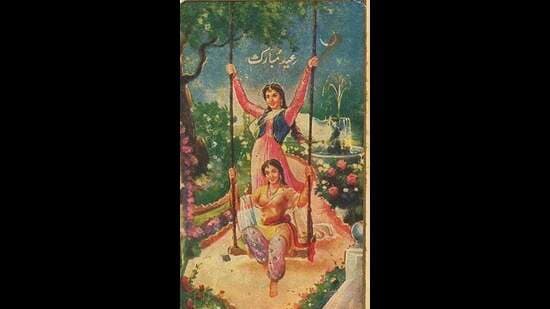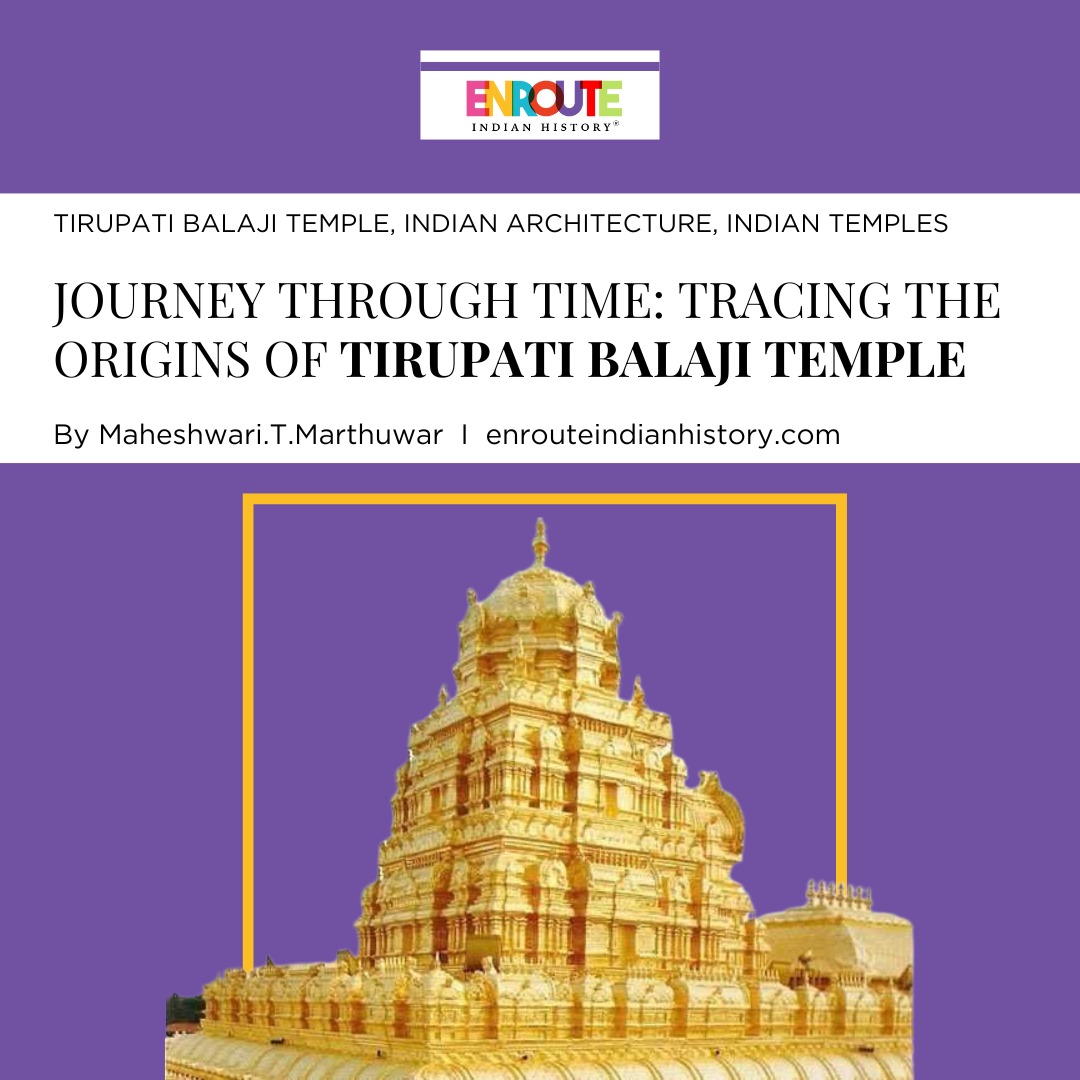
In the ninth month of the Islamic (lunar) calendar, all practising adult Muslims observe Ramzan: a month-long fast, abstaining from food, drinks and desires, from sunrise to sunset. The aim of the fast is not only to feel close to God and appreciate one’s life through abstinence but also to make amends and empathise with those who are less privileged. Ramzan is followed by the joyous celebration of Eid, marking an end to a prolonged fast and a period of introspection.

Emperor Bahadur Shah and his procession to celebrate Eid, 1843
Source: British Library via PICRYL
Fasting is abstaining from food and water over a variable period. It could be “a partial or total abstention from all foods, or …. from prohibited foods” (Trepanowski and Bloomer 2010). Fasting or periodic fasting has been part of many religious and cultural norms (Golbidi et al. 2017) as a form of devotion, spiritualism and meditation. Medically speaking, dietary interventions in the form of fasting have been a hot topic and have proven to be beneficial in some aspects, be it intermittent fasting (IF), time-restricted feeding (TRF), calorie restriction (CR), alternate-day fasting (ADF), fasting-mimicking diet (FMD) or prolonged fasting.
Fasting is one of the five pillars of Islam: Faith (shahada), Prayer (salat), Alms (zakat), Fasting (sawm) and Pilgrimage (hajj). During the holy month of Ramzan or nomb masam (in Malayalam), Roza, Sawm or Siyam is observed between sunrise and sunset. This month is sacred as the Qur’an, the Islamic holy book, was revealed to the masses. According to Islam, all healthy, abled-bodied adult Muslims should observe this month-long fast, while children, the elderly, the sick, and women who are otherwise pregnant, lactating, or menstruating, should refrain from fasting.
An Early Start
A typical Ramzan day begins with sehri, or the pre-dawn meal until you break the fast (Roza) with the evening meal or Iftar. Following sehri, the first prayer (Fajr) is recited before sunrise. What is interesting to note is that this time frame before sunrise is the Brahma muhurtha in traditional Hindu customs. Alternatively known as the time of Brahma or the ‘Creator’s Hour’, it is the auspicious period ideal for introspection, reading, and meditation. Moreover, adhering to the natural circadian rhythm and rising with the Sun has innate physiological benefits for the human body. After a few days, the body adjusts to this routine and aligns with the natural circadian rhythm.
Ideally, the Sehri should be a high-carb meal. But the key to sustaining the fast till Iftar is to hydrate and satiate. Foods rich in fibre and protein should be a part of the Sehri, including high-carb foods that take longer to digest. Since the fast does not allow water intake, electrolytes through lemonade, coconut water and juices are recommended. Finally, nuts and seeds are crucial for such fast as they help curb cravings and keep up satiety levels. After the morning prayer, the 12-hour fast (Roza) is observed, during which no food or water can be partaken. After sunset, Muslims feast on Ifatri foods, replenish their dietary needs and often stay up for the next Sehri and Fajr.

Dates are a good source of carbohydrates, fibre, potassium and magnesium
Source: draxe.com
What is Ramzan Fasting?
Although there are many similarities, fasting during this month cannot be defined as Intermittent fasting (IF) or categorised under time-restricted feeding (TRF). It has its category known as Ramadan Fasting or Religious Fasting (RF), and many studies have been on RF and its practitioners to understand both the short and long-term effects of prolonged fasting rituals. Ramadan Fasting (RF) involves more of a night-time or nocturnal eating routine when compared to daily eating habits and schedules. So naturally, this impacts one’s circadian rhythms, hormonal responses and the overall pattern of sleep cycles. Lessan and Ali (2019) describe RF as “a state of intermittent liver glycogen depletion and repletion”.
The two main hormones related to hunger are Leptin and Ghrelin. While Ghrelin, the Hunger Hormone, signals our brain when hungry (amongst other vital functions), Leptin tells the body when satiated and helps maintain energy levels. Overall, fasting during Ramzan can alter hunger patterns, and the rate of metabolism, and satiate cravings by “modifying the diurnal pattern of leptin secretion” (Sofer et al. 2013).

A sample of Sehri and Iftari food items (from Left to Right) Top: Laung Chidey, Mohabbat ka Sharbat, Kalmi Vadas; Bottom: Pheni, Khajla, Sheermal
Source: Chef Sadaf Hussain for GOYA
Physiological Response to Ramzan Fasting
An interesting experiment by Sofer and the team (Sofer et al. 2011; 2013) was conducted based on the fasting regimen of Muslims during Ramzan. Their experiment also considered previous research (Kassab et al. 2004; Bogdan et al. 2005) that showed significant differences in adult Muslims carrying out daily Roza and their metabolic function and hormonal secretion patterns during Ramzan. They wanted to know if this fasting model could be applied to reduce abdominal obesity, resistance to insulin and other metabolic conditions related to hunger. Specifically, they wanted to experiment with the impact of a consistent low-calorie but high-carbohydrate dinner and see if its adherence could help people commit to long-term diet-based regimens.
Their results were per their hypothesis as there was a trend of significantly higher weight loss, absolute BMI reduction, average abdominal circumference reductions and reduction of body fat percentage. What was more interesting was that this experimental regimen of high-carb dinners allowed for higher satiety levels and reduced hunger pangs (Sofer et al. 2011; 2013). Another experiment, this time on healthy adult Indian Muslims who observed Ramzan, showed significant and beneficial changes in high-density lipoprotein (HDL) levels and liver function tests attributed to an overall reduction of body weight and changes in cytokines and alteration in sleep patterns (Urooj et al. 2020).
Celebrating Faith and Commitment
Eid, or Eid al-Fitr, is celebrated after completing this strict albeit renewing month-long regimen. Researchers say that the positive psychological impact of RF can be the sense of accomplishment or the feeling of renewed faith in oneself to commit to daily Roza.

Vintage Eid Greeting Card 1940
Source: Hindustan Times
Fasting, in general, has been known to facilitate healthy ageing (Francesco et al. 2018) and positive psychological effects while negatively impacting one’s emotional state of mind (Wang and Wu 2022). Roza and the month-long fasting during Ramzan have shown benefits like those that help with reproductive performance and ailments (Lessan and Ali 2019), mitigate abdominal obesity (Sofer et al. 2013), an overall reduction in body weight, although the opposite is known to occur in the following months; and a favourable effect on the immune system (Rouhani and Azadbakht 2014). Since many factors influence how religious fasting affects an individual, more focused research is required to understand the long-term benefits of prolonged fasting. Nevertheless, Ramzan fasting can be a healthy way to detoxify while fueling the body with quality ingredients.
References:
Bogdan, A., Bouchareb, B., & Touitou, Y. (2005). Response of circulating leptin to Ramadan daytime fasting: a circadian study. The British journal of nutrition, 93(4), 515–518. https://doi.org/10.1079/bjn20041380
Francesco, A. D., Germanio, C. D., & Bernier, M. (2018). A time to fast. Science. https://doi.org/aau2095
Golbidi, S., Daiber, A., Korac, B., Li, H., Essop, M. F., & Laher, I. (2017). Health Benefits of Fasting and Caloric Restriction. Current diabetes reports, 17(12), 123. https://doi.org/10.1007/s11892-017-0951-7
Kassab, S., Abdul-Ghaffar, T., Nagalla, D.S., Sachdeva, U., and Nayar, U. (2004). Interactions between leptin, neuropeptide-Y and insulin with chronic diurnal fasting during Ramadan. Annals of Saudi Medicine. Vol 25(4) https://doi.org/10.5144/0256-4947.2004.345
Lessan, N. and Ali, T. (2019). Energy Metabolism and Intermittent Fasting: The Ramadan Perspective. Nutrients Vol 11, 1192. doi:10.3390/nu11051192
Li, Y., Zhang, H., Wang, Y., Li, D., & Chen, H. (2022). Advances in circadian clock regulation of reproduction. Advances in Protein Chemistry and Structural Biology, 137, 83-133. https://doi.org/10.1016/bs.apcsb.2023.02.008
Rouhani, M. H., & Azadbakht, L. (2014). Is Ramadan fasting related to health outcomes? A review on the related evidence. Journal of Research in Medical Sciences: The Official Journal of Isfahan University of Medical Sciences, 19(10), 987-992. https://www.ncbi.nlm.nih.gov/pmc/articles/PMC4274578/
Sofer, S., Eliraz, A., Kaplan, S., Voet, H., Fink, G., Kima, T. and Madar, Z. (2011), Greater Weight Loss and Hormonal Changes After 6 Months Diet With Carbohydrates Eaten Mostly at Dinner. Obesity, 19: 2006-2014. https://doi.org/10.1038/oby.2011.48
Sofer, S., Stark, A., Fink, G., & Madar, Z. (2013). A Diet with Carbohydrates Eaten Primarily at Dinner: An Innovative, Nutritional Approach to End the Vicious Cycle of Abdominal Obesity. Nutrition in the Prevention and Treatment of Abdominal Obesity, 401-414. https://doi.org/10.1016/B978-0-12-407869-7.00035-0
Trepanowski, J. F., & Bloomer, R. J. (2010). The impact of religious fasting on human health. Nutrition journal, 9, 57. https://doi.org/10.1186/1475-2891-9-57
Urooj, A., Kotebagilu, N. P., Shivanna, L. M., Anandan, S., Thantry, A. N., & Siraj, S. F. (2020). Effect of Ramadan Fasting on Body Composition, Biochemical Profile, and Antioxidant Status in a Sample of Healthy Individuals. International Journal of Endocrinology and Metabolism, 18(4). https://doi.org/10.5812/ijem.107641
Wang, Y., & Wu, R. (2022). The Effect of Fasting on Human Metabolism and Psychological Health. Disease Markers, 2022. https://doi.org/10.1155/2022/5653739
Fasting in Islam. (2024, March 25). In Wikipedia. Fasting in Islam – Wikipedia
The Five Pillars of Islam | The Metropolitan Museum of Art
Roza, Ramadan, Ramzan: There is more to the month of fasting than how it is spelled
An Iftar Walk through the Streets of Old Delhi with Chef Sadaf Hussain — GOYA
https://food.ndtv.com/food-drinks/ramzan-2016-what-to-eat-and-avoid-during-sehri-1416315
- April 25, 2024
- 25 Min Read
- April 25, 2024
- 14 Min Read
- April 25, 2024
- 6 Min Read


























